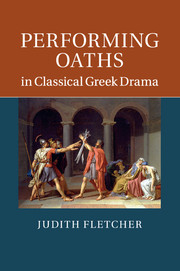Book contents
- Frontmatter
- Contents
- Acknowledgments
- A note on abbreviations
- Introduction
- Chapter 1 From curses to blessings: horkos in the Oresteia
- Chapter 2 Speaking like a man: oaths in Sophocles’ Trachiniae and Philoctetes
- Chapter 3 Horkos in the polis: Athens, Thebes and Sophocles
- Chapter 4 Perjury and other perversions: Euripides’ Phoenissae, Orestes and Cyclops
- Chapter 5 Twisted justice in Aristophanes’ Clouds
- Chapter 6 Women and oaths in Euripides
- Chapter 7 How to do things with Euripides: Aristophanes’ Thesmophoriazusae
- Chapter 8 Swearing off sex: the women's oath in Aristophanes’ Lysistrata
- Conclusion
- Bibliography
- Index locorum
- General index
Chapter 3 - Horkos in the polis: Athens, Thebes and Sophocles
Published online by Cambridge University Press: 05 December 2011
- Frontmatter
- Contents
- Acknowledgments
- A note on abbreviations
- Introduction
- Chapter 1 From curses to blessings: horkos in the Oresteia
- Chapter 2 Speaking like a man: oaths in Sophocles’ Trachiniae and Philoctetes
- Chapter 3 Horkos in the polis: Athens, Thebes and Sophocles
- Chapter 4 Perjury and other perversions: Euripides’ Phoenissae, Orestes and Cyclops
- Chapter 5 Twisted justice in Aristophanes’ Clouds
- Chapter 6 Women and oaths in Euripides
- Chapter 7 How to do things with Euripides: Aristophanes’ Thesmophoriazusae
- Chapter 8 Swearing off sex: the women's oath in Aristophanes’ Lysistrata
- Conclusion
- Bibliography
- Index locorum
- General index
Summary
Horkos, an essential building block of the laws that Athenian citizens helped to produce and maintain, can function in tragedy as a symbol for civic and political integrity. The man who knows how to use the oath effectively is also the man who can form bonds with other men and participate in the communal discourses of his polis. In the preceding chapter we observed how the oath bound young men to the duties, obligations and reciprocal economies of manhood. But their maturation was accomplished beyond the polis: there is no sense of a political backdrop in Trachiniae, which is set in the domestic space of Deianeira's household. Philoctetes takes place on a desolate island with a single inhabitant, and is thus devoid of any political structure. Sophocles captures the experiences of Hyllus and Neoptolemus just as they are about to step into adult society. Any specific political associations are muted, but the oath ritual suggests that these young men are now capable of the civic transactions of adult life because they have developed the capacity to enact one of the most important rituals of the polis.
The purpose of this chapter is to explore the way that Sophocles refines the powerful symbolism of horkos by showing how it works, or fails to work, in the tyrannical city of Thebes. I will then turn to the single Sophoclean play set in or near Athens, Oedipus at Colonus, to contrast the operation of the oath in a setting that is both democratic and sanctified. I want to look at this play last, although in the story proper it is the penultimate installment, because it provides a good contrast to how the oath operates in the Antigone and Oedipus Tyrannus. Produced over several decades, Sophocles’ Theban plays do not comprise a thematically unified trilogy like the Oresteia. My reason for reading them collectively is that they all deal with the intricate connections between language, law and the state in ways that illustrate how the oath can function as a signifier of the political health of the polis in Athenian drama. If, as Froma Zeitlin once put it, Thebes is depicted in tragedy as the “Anti-Athens,” it should follow that representations of the oath will be quite different in these two disparate city-states. A straightforward enough supposition, it would seem: but this comparison of Sophocles’ Thebes and Athens will yield more complex conclusions about the ideological force of horkos.
- Type
- Chapter
- Information
- Performing Oaths in Classical Greek Drama , pp. 102 - 122Publisher: Cambridge University PressPrint publication year: 2011



